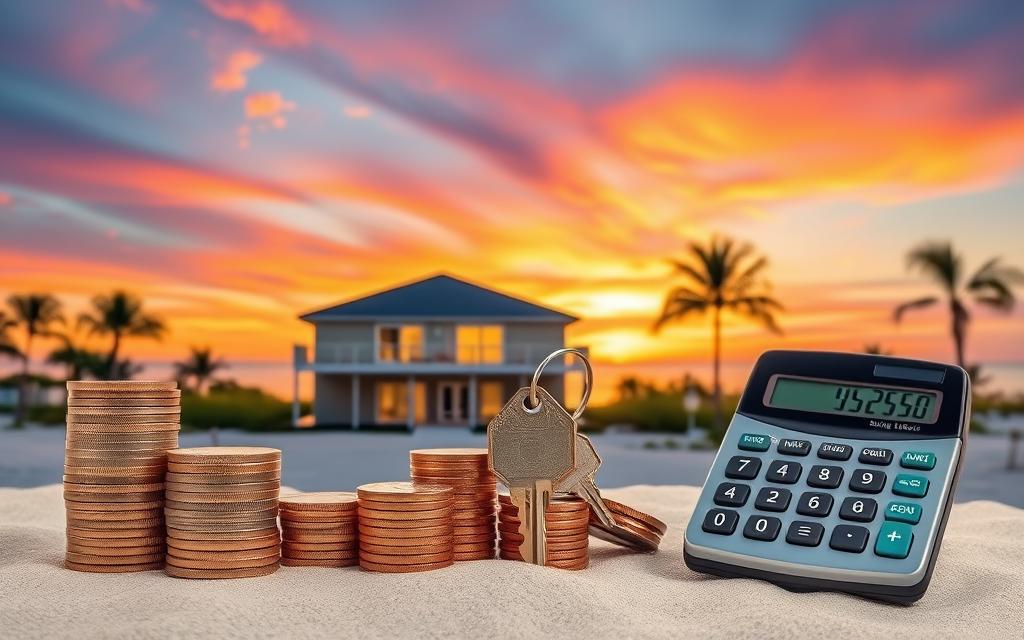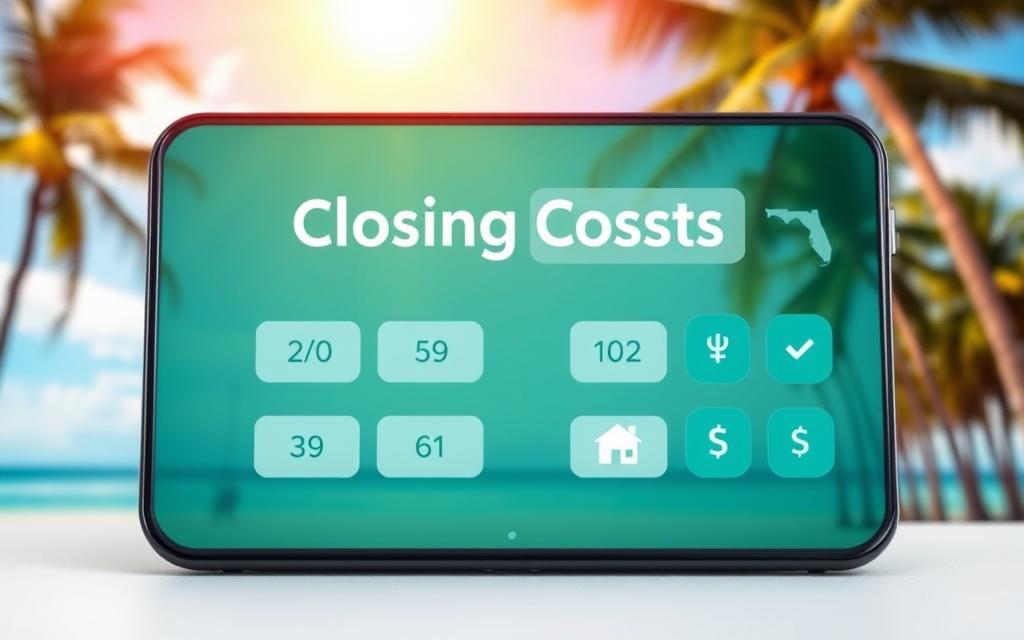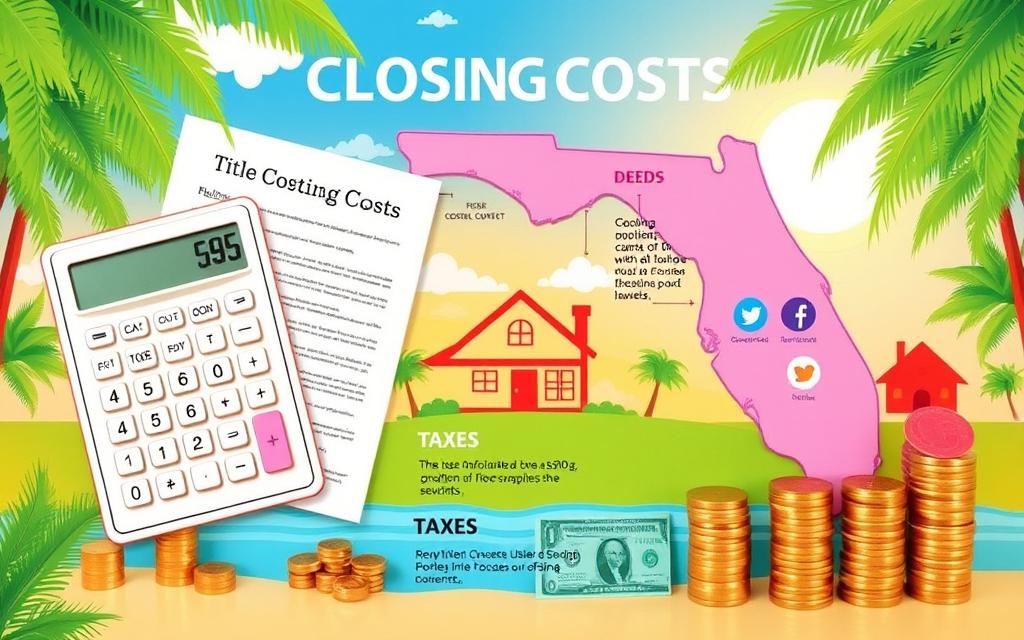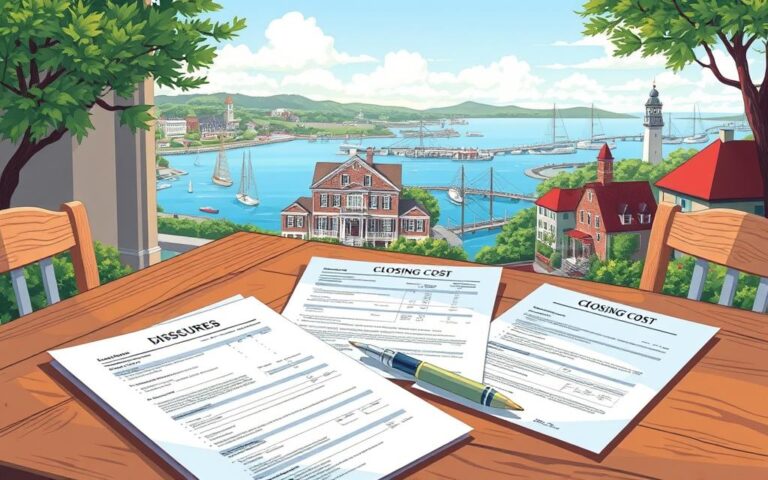Understanding Closing Costs in Florida: A Guide
Did you know that closing costs in Florida can be around $8,550 for a $375,000 mortgage? This is way above the national average of $6,800. It’s about 2.3% of the loan amount, showing the complex financial details of buying a home in Florida. Even without income taxes, closing costs in Florida can still be high, making it key to understand and prepare for them.
Closing costs are all the extra fees that come up during a home sale. It’s important for both buyers and sellers to know what to expect. Buyers might pay for appraisal fees, loan origination fees, and home inspections. Sellers usually cover agent commissions and taxes. Knowing these costs helps in smoother negotiations and transactions.
Key Takeaways
- The average closing cost in Florida is approximately 2.3% of the home purchase price.
- Buyers can expect to pay anywhere from 2% to 5% in closing costs.
- Sellers typically face closing costs ranging from 5% to 10% of the home’s sale price.
- Closing costs include fees like title insurance, appraisal fees, and real estate commissions.
- Negotiation of closing costs is common between buyers and sellers.
- Tools like closing cost calculators can help estimate final expenses.
What are Closing Costs?
Understanding closing costs in Florida is key for anyone buying property. These costs include various fees needed before a deal is done. They cover lender fees, title, and insurance. Knowing what to expect can save you time and money.
Definition of Closing Costs in Real Estate
Closing costs in real estate are the fees for finalizing a property purchase. They include loan origination, appraisal, title insurance, and legal fees. Each part is important for a smooth deal, with both buyers and sellers paying their share. In Florida, buyers usually pay 2% to 5% of the home’s price in closing fees.
Typical Percentage of Closing Costs
Closing costs in Florida are about 2.3% of a home’s sale price. With a median home price of $409,400 in July 2024, this means around $9,416 in fees. Costs vary by area, with Sarasota at $11,132 for a $484,000 home and Jacksonville at $7,141 for a $310,500 home. These numbers show the importance of budgeting for property purchases.
Average Closing Costs in Florida
When you’re thinking about buying a property in Florida, it’s key to know the average closing costs. These costs usually fall between 2% and 3% of the home’s price. For a median-priced home, which is about $389,990, the average closing costs are around $8,970.
This amount includes fees like appraisal, inspection, and loan origination. These are important to consider when planning your budget.
Statistics on Average Closing Costs
Recent reports show that closing costs in Florida average about $8,554. This makes Florida one of the pricier places for buying a home. For a median home sale in Jacksonville, priced at $315,000, costs can range from $6,300 to $15,750.
Each type of fee adds up quickly. It’s crucial to understand these averages for budgeting.
Regional Variations in Closing Costs
Closing costs can vary a lot depending on where you are in Florida. For example, in Sarasota, costs can reach up to $11,132 because of higher property values. In contrast, Jacksonville might see costs around $7,141 due to lower prices.
These differences come from local taxes, property prices, and specific fees in each area. I recommend checking this guide for more details on how location impacts closing costs.

Components of Closing Costs in Florida
Understanding closing costs is key for anyone buying or selling a home in Florida. These costs can differ a lot between buyers and sellers. It’s important to know what to expect as you go through the process.
Buyer-Specific Closing Costs
Buyers often face a big part of the closing costs. These include lender fees for processing the loan, appraisal fees, and inspection fees. Title search fees and prepaid taxes and insurance are also part of the costs.
Closing costs can be up to 5% of the purchase price. Planning ahead is a good idea.
Seller-Specific Closing Costs
Sellers also have their own closing costs in Florida. These include realtor commissions, which can be about 6% of the sale price. Sellers also pay transfer taxes and outstanding mortgage payments.
Understanding these fees is crucial for sellers. It helps avoid any surprises when selling a home.
Third-Party and Miscellaneous Fees
Third-party fees are a big part of closing costs in Florida. These include fees for settlement services, averaging around $650. There are also escrow services and documentary stamp tax fees.
Reviewing these fees is important. It helps both buyers and sellers understand the financial side of closing.
Understanding the Closing Costs Breakdown Florida
When you’re buying or selling a home in Florida, knowing the closing costs is key. Both buyers and sellers have to pay various fees. Knowing these costs ahead of time can help avoid surprises on closing day.
Detailed Breakdown of Buyer Costs
Buyers face several costs during the closing process. These costs usually range from 2% to 3% of the home’s price. This includes appraisal fees, which can be between $300 to $550, and homeowner association charges.
There are also credit report fees and home inspection fees, which are about $450. Settlement fees can range from $550 to $750. Keeping track of these costs is important to avoid financial surprises.
Detailed Breakdown of Seller Costs
Sellers also have their own costs to consider. These can add up to about 8%-10% of the home’s sale price. A big part of this is the real estate commission, which is around 5.8% of the sale price.
Other fees include transfer taxes, title insurance, and settlement charges. There are also recording fees and other expenses like outstanding utilities and HOA fees. Knowing these costs helps sellers plan their finances for closing.
Who Pays Closing Costs in Florida?
Knowing who pays closing costs in Florida is key for home buyers and sellers. Both sides usually split these costs, but sellers often pay more. Closing costs can be a big part of the home’s price, so it’s important to understand who pays what.
Typical Conventions in Florida Transactions
In Florida, sellers often cover costs like real estate commissions and title services. They might pay 5% to 10% of the sale price. Agent commissions are a big part of this, taking up 5% to 6% of the sale value.
In some places, like Miami-Dade, buyers might pay for title insurance. Buyers usually handle settlement costs, which can be 2% to 5% of the home’s price. This depends on what the buyer and seller agree on.
Negotiating Closing Costs Responsibilities
Talking about closing costs can change the financial deal for buyers and sellers. I can suggest changes, like asking the seller to pay for some fees or getting lower commissions. Talking openly about closing costs can lead to saving money.
The success of these talks depends on clear communication and both sides being willing to compromise. For more information, check out this resource on closing costs.
How to Estimate Your Closing Costs in Florida
Estimating closing costs is key when buying a home in Florida. Knowing these costs helps me prepare financially for the deal. A closing costs calculator Florida makes this easier, letting me input details like the home’s price and fees.
Using a Closing Costs Calculator Florida
A closing costs calculator Florida gives me a clear view of expected fees. By entering the right info, I get a detailed breakdown. This includes things like title insurance and transfer taxes. It shows how much I’ll likely pay, usually between 7% and 9% of the home’s price.

Obtaining Estimates from Lenders
Getting estimates from lenders also helps me understand closing costs. After applying for a mortgage, I can ask for a Good Faith Estimate (GFE). This document lists expected costs and shows my financial responsibilities. It helps me compare lenders and make a better choice, saving me money and making my decision more informed.
Lowering Your Closing Costs in Florida
Buying a home in Florida can be expensive, especially when it comes to closing costs. But, there are ways to save money. By using smart strategies, you can cut down on these costs and save a lot.
Strategies for Buyers to Reduce Costs
Buyers can talk to sellers to cover some closing costs. This can make buying a home more affordable. It’s also smart to compare loan offers from different lenders.
Some lenders offer credits to help with costs. And, there are grants in Florida, like the Own a Home Opportunity Grant Program, that can help too.
Negotiation Tactics for Sellers
Sellers can help buyers by being open to negotiations. For example, they can talk about lowering real estate commissions. This can save buyers money.
Being flexible can also help close deals faster. Talking openly with buyers can make the process smoother. It can also help build a good relationship with them.
Impact of Location on Closing Costs
Closing costs for real estate in Florida can change a lot based on where you are. It’s key to know how these costs can affect your money when buying or selling a home. Different areas have different rates and extra fees, which can really change how much you need to pay.
For example, buying a home in Tampa might cost more than in less crowded places. It could be up to $8,300 for a $323,000 home.
County-Specific Closing Costs Variations
When I’m looking to buy a home, knowing the closing costs in my county is important. In Florida, counties have their own fees like documentary stamp taxes. These can add a lot to what I need to pay at closing.
Also, the cost of things like title searches and pest inspections can vary by county. This shows why it’s important to do my homework on local fees.
Assessing Additional Local Fees
I also need to think about extra local fees that might not be obvious. This includes escrow fees, which are usually 1-2% of the home’s price. There are also lender fees for processing my mortgage.
By looking at all these costs, I can get ready for what I might need to pay. This helps me make a smart choice about my property deal.
FAQ
What are typical closing costs in Florida?
In Florida, closing costs usually range from 2% to 5% of a home’s price. For a 5,000 mortgage, that’s about ,554. Knowing these costs helps with budgeting.
What are the most common components of closing costs?
Common costs include lender fees, title insurance, and appraisal fees. Home inspection and prepaid taxes and insurance are also part of it. Sellers might pay real estate agent commissions and transfer taxes.
How can I estimate my closing costs in Florida?
You can use a closing costs calculator for an estimate. It considers the property value and loan details. A Good Faith Estimate (GFE) from your lender also helps.
Who typically pays closing costs in Florida?
In Florida, both buyers and sellers usually split closing costs. But, how they split it can vary. It’s key to know local practices and negotiate.
Do closing costs vary by location in Florida?
Yes, closing costs differ by location in Florida. For example, Sarasota’s costs can reach ,132. Jacksonville’s average is about ,141. Local fees greatly affect closing costs.
What strategies exist to lower closing costs?
To reduce costs, buyers can ask sellers to cover some fees. They can also compare loan offers. Sellers might lower their agent’s commission to help buyers.
What should I know about closing fee negotiation in Florida?
Negotiating closing costs is key. Knowing who pays what can help both sides. For example, in Miami-Dade County, buyers might pay owner’s title insurance.







